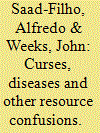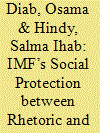| Srl | Item |
| 1 |
ID:
116894


|
|
|
|
|
| Publication |
2013.
|
| Summary/Abstract |
Natural resource rents, development assistance and unrequited foreign exchange inflows such as remittances relax the balance of payments constraint on economic growth. The failure of some governments to translate these resources into successful development has been attributed to an affliction called 'Dutch disease', or, more ominously, to a 'curse' associated with the availability of natural resources. This paper examines the disease/curse analysis and rejects it in favour of a political economy explanation of the problems associated with resource use. We argue that conventional analysis of resource-rich countries is misleading because its various manifestations are based on inappropriate assumptions and flawed logic. In practice the 'curse' and the 'disease' are outcomes of policy decisions, rather than manifestations of deep structural weaknesses, and they are more likely to be suffered in countries whose governments pursue neoliberal economic policies.
|
|
|
|
|
|
|
|
|
|
|
|
|
|
|
|
| 2 |
ID:
181814


|
|
|
|
|
| Summary/Abstract |
A substantial body of literature has been produced about the IMF’s drift away from neoliberal orthodoxy in the aftermath of the 2007/08 global financial crisis. This article assesses the degree to which the IMF’s post-crisis change in discourse toward adding more emphasis on social protection was put into action in Egypt’s 2016 economic reform program. Beyond a noticeable discursive change, our research found that there was very little—if any—practical change. First, we demonstrate how the social component of the program was much smaller than the neoliberal or ‘business-as-usual’ component, not only as a share of program measures but also in terms of their magnitude. Second, we found that even this small component had a very similar equivalent in the last major program between the IMF and Egypt in 1991, thus rendering it less novel, and therefore casting doubt on the IMF’s claims of change.
|
|
|
|
|
|
|
|
|
|
|
|
|
|
|
|
| 3 |
ID:
129838


|
|
|
|
|
| Publication |
2014.
|
| Summary/Abstract |
The strong public support for displays of Maori culture since the mid-1980s in New Zealand under biculturalism appears paradoxical. Cultural values of respect for tradition, community, hierarchy, and attachment to place are promoted abroad and incorporated into public institutions at home at the same time as neoliberal economic policies emphasize individualism, self-reliance, rational behavior, and mobility. This article argues that Maori cultural practices supply the values of communal belonging and solidarity that were previously associated by the public with the New Zealand state. Thus, they support a postmodern conception of national identity and guarantee the legitimacy of the neoliberal state.
|
|
|
|
|
|
|
|
|
|
|
|
|
|
|
|